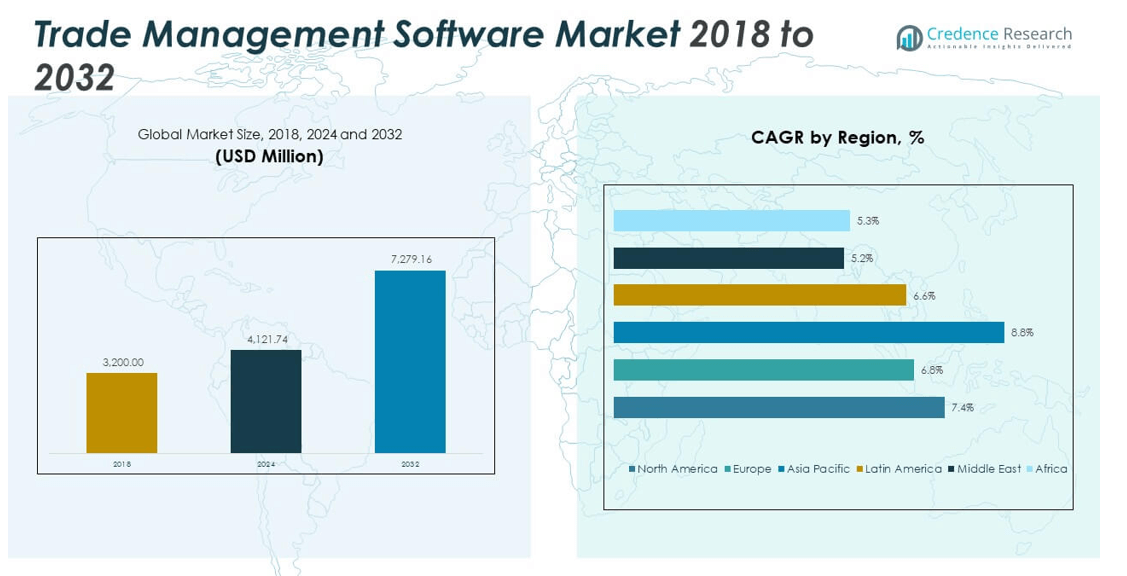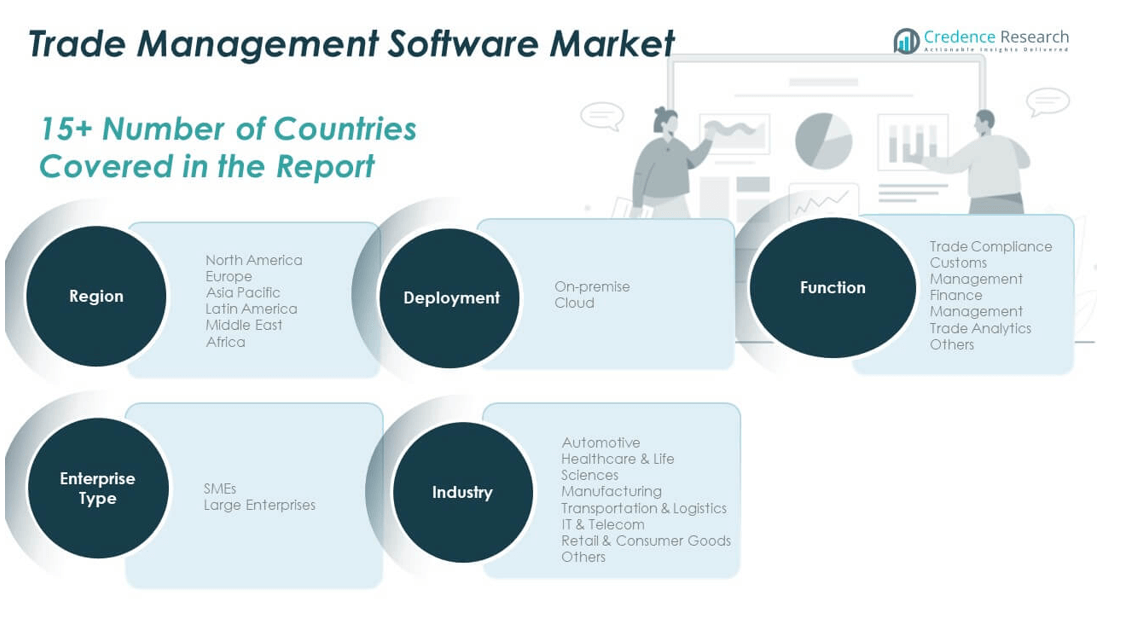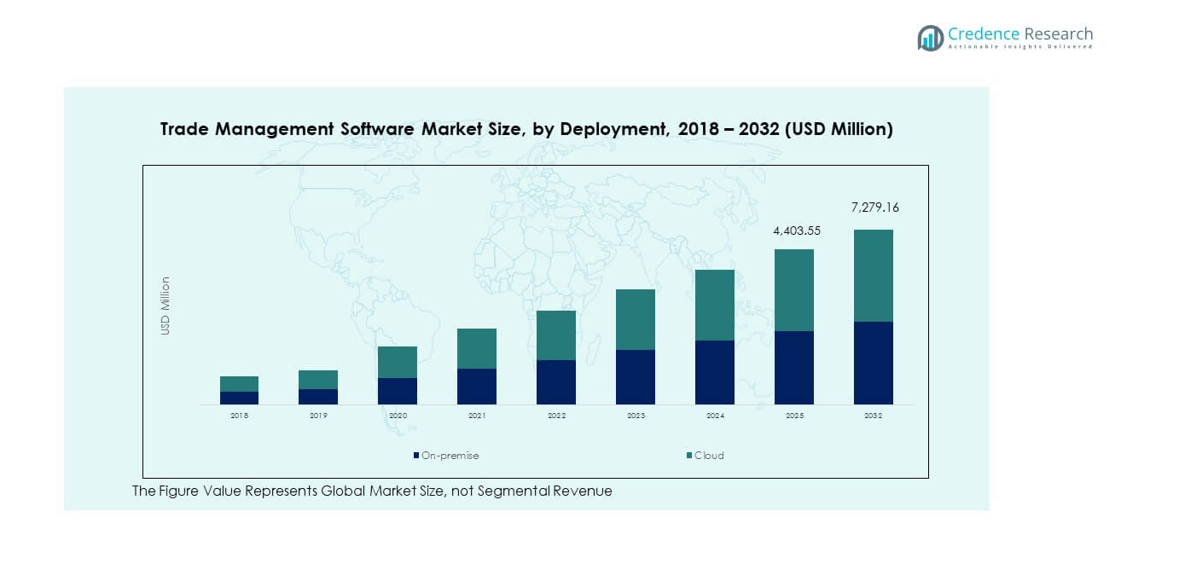CHAPTER NO. 1 : GENESIS OF THE MARKET
1.1 Market Prelude – Introduction & Scope
1.2 The Big Picture – Objectives & Vision
1.3 Strategic Edge – Unique Value Proposition
1.4 Stakeholder Compass – Key Beneficiaries
CHAPTER NO. 2 : EXECUTIVE LENS
2.1 Pulse of the Industry – Market Snapshot
2.2 Growth Arc – Revenue Projections (USD Million)
2.3. Premium Insights – Based on Primary Interviews
CHAPTER NO. 3 : TRADE MANAGEMENT SOFTWARE MARKET FORCES & INDUSTRY PULSE
3.1 Foundations of Change – Market Overview
3.2 Catalysts of Expansion – Key Market Drivers
3.2.1 Momentum Boosters – Growth Triggers
3.2.2 Innovation Fuel – Disruptive Technologies
3.3 Headwinds & Crosswinds – Market Restraints
3.3.1 Regulatory Tides – Compliance Challenges
3.3.2 Economic Frictions – Inflationary Pressures
3.4 Untapped Horizons – Growth Potential & Opportunities
3.5 Strategic Navigation – Industry Frameworks
3.5.1 Market Equilibrium – Porter’s Five Forces
3.5.2 Ecosystem Dynamics – Value Chain Analysis
3.5.3 Macro Forces – PESTEL Breakdown
3.6 Price Trend Analysis
3.6.1 Regional Price Trend
3.6.2 Price Trend by product
CHAPTER NO. 4 : KEY INVESTMENT EPICENTER
4.1 Regional Goldmines – High-Growth Geographies
4.2 Product Frontiers – Lucrative Product Categories
4.3 Function Sweet Spots – Emerging Demand Segments
CHAPTER NO. 5: REVENUE TRAJECTORY & WEALTH MAPPING
5.1 Momentum Metrics – Forecast & Growth Curves
5.2 Regional Revenue Footprint – Market Share Insights
5.3 Segmental Wealth Flow – Deployment & Function Revenue
CHAPTER NO. 6 : TRADE & COMMERCE ANALYSIS
6.1. Import Analysis by Region
6.1.1. Global Trade Management Software Market Import Revenue By Region
6.2. Export Analysis by Region
6.2.1. Global Trade Management Software Market Export Revenue By Region
CHAPTER NO. 7 : COMPETITION ANALYSIS
7.1. Company Market Share Analysis
7.1.1. Global Trade Management Software Market: Company Market Share
7.2. Global Trade Management Software Market Company Revenue Market Share
7.3. Strategic Developments
7.3.1. Acquisitions & Mergers
7.3.2. New Product Launch
7.3.3. Regional Expansion
7.4. Competitive Dashboard
7.5. Company Assessment Metrics, 2024
CHAPTER NO. 8 : TRADE MANAGEMENT SOFTWARE MARKET – BY DEPLOYMENT SEGMENT ANALYSIS
8.1. Trade Management Software Market Overview by Deployment Segment
8.1.1. Trade Management Software Market Revenue Share By Deployment
8.2. On-premise
8.3. Cloud
CHAPTER NO. 9 : TRADE MANAGEMENT SOFTWARE MARKET – BY FUNCTION SEGMENT ANALYSIS
9.1. Trade Management Software Market Overview by Function Segment
9.1.1. Trade Management Software Market Revenue Share By Function
9.2. Trade Compliance
9.3. Customs Management
9.4. Finance Management
9.5. Trade Analytics
9.6. Others
CHAPTER NO. 10 : TRADE MANAGEMENT SOFTWARE MARKET – BY ENTERPRISE TYPE SEGMENT ANALYSIS
10.1. Trade Management Software Market Overview by Enterprise Type Segment
10.1.1. Trade Management Software Market Revenue Share By Enterprise Type
10.2. SMEs
10.3. Large Enterprises
CHAPTER NO. 11 : TRADE MANAGEMENT SOFTWARE MARKET – BY INDUSTRY SEGMENT ANALYSIS
11.1. Trade Management Software Market Overview by Industry Segment
11.1.1. Trade Management Software Market Revenue Share By Industry
11.2. Automotive
11.3. Healthcare & Life Sciences
11.4. Manufacturing
11.5. Transportation & Logistics
11.6. IT & Telecom
11.7. Retail & Consumer Goods
11.8. Others
CHAPTER NO. 12 : TRADE MANAGEMENT SOFTWARE MARKET – REGIONAL ANALYSIS
12.1. Trade Management Software Market Overview by Region Segment
12.1.1. Global Trade Management Software Market Revenue Share By Region
12.1.2. Regions
12.1.3. Global Trade Management Software Market Revenue By Region
12.1.4. Deployment
12.1.5. Global Trade Management Software Market Revenue By Deployment
12.1.6. Function
12.1.7. Global Trade Management Software Market Revenue By Function
12.1.8. Enterprise Type
12.1.9. Global Trade Management Software Market Revenue By Enterprise Type
12.1.10. Industry
12.1.11. Global Trade Management Software Market Revenue By Industry
CHAPTER NO. 13 : NORTH AMERICA TRADE MANAGEMENT SOFTWARE MARKET – COUNTRY ANALYSIS
13.1. North America Trade Management Software Market Overview by Country Segment
13.1.1. North America Trade Management Software Market Revenue Share By Region
13.2. North America
13.2.1. North America Trade Management Software Market Revenue By Country
13.2.2. Deployment
13.2.3. North America Trade Management Software Market Revenue By Deployment
13.2.4. Function
13.2.5. North America Trade Management Software Market Revenue By Function
13.2.6. Enterprise Type
13.2.7. North America Trade Management Software Market Revenue By Enterprise Type
13.2.8. Industry
13.2.9. North America Trade Management Software Market Revenue By Industry
13.3. U.S.
13.4. Canada
13.5. Mexico
CHAPTER NO. 14 : EUROPE TRADE MANAGEMENT SOFTWARE MARKET – COUNTRY ANALYSIS
14.1. Europe Trade Management Software Market Overview by Country Segment
14.1.1. Europe Trade Management Software Market Revenue Share By Region
14.2. Europe
14.2.1. Europe Trade Management Software Market Revenue By Country
14.2.2. Deployment
14.2.3. Europe Trade Management Software Market Revenue By Deployment
14.2.4. Function
14.2.5. Europe Trade Management Software Market Revenue By Function
14.2.6. Enterprise Type
14.2.7. Europe Trade Management Software Market Revenue By Enterprise Type
14.2.8. Industry
14.2.9. Europe Trade Management Software Market Revenue By Industry
14.3. UK
14.4. France
14.5. Germany
14.6. Italy
14.7. Spain
14.8. Russia
14.9. Rest of Europe
CHAPTER NO. 15 : ASIA PACIFIC TRADE MANAGEMENT SOFTWARE MARKET – COUNTRY ANALYSIS
15.1. Asia Pacific Trade Management Software Market Overview by Country Segment
15.1.1. Asia Pacific Trade Management Software Market Revenue Share By Region
15.2. Asia Pacific
15.2.1. Asia Pacific Trade Management Software Market Revenue By Country
15.2.2. Deployment
15.2.3. Asia Pacific Trade Management Software Market Revenue By Deployment
15.2.4. Function
15.2.5. Asia Pacific Trade Management Software Market Revenue By Function
15.2.6. Enterprise Type
15.2.7. Asia Pacific Trade Management Software Market Revenue By Enterprise Type
15.2.8. Industry
15.2.9. Asia Pacific Trade Management Software Market Revenue By Industry
15.3. China
15.4. Japan
15.5. South Korea
15.6. India
15.7. Australia
15.8. Southeast Asia
15.9. Rest of Asia Pacific
CHAPTER NO. 16 : LATIN AMERICA TRADE MANAGEMENT SOFTWARE MARKET – COUNTRY ANALYSIS
16.1. Latin America Trade Management Software Market Overview by Country Segment
16.1.1. Latin America Trade Management Software Market Revenue Share By Region
16.2. Latin America
16.2.1. Latin America Trade Management Software Market Revenue By Country
16.2.2. Deployment
16.2.3. Latin America Trade Management Software Market Revenue By Deployment
16.2.4. Function
16.2.5. Latin America Trade Management Software Market Revenue By Function
16.2.6. Enterprise Type
16.2.7. Latin America Trade Management Software Market Revenue By Enterprise Type
16.2.8. Industry
16.2.9. Latin America Trade Management Software Market Revenue By Industry
16.3. Brazil
16.4. Argentina
16.5. Rest of Latin America
CHAPTER NO. 17 : MIDDLE EAST TRADE MANAGEMENT SOFTWARE MARKET – COUNTRY ANALYSIS
17.1. Middle East Trade Management Software Market Overview by Country Segment
17.1.1. Middle East Trade Management Software Market Revenue Share By Region
17.2. Middle East
17.2.1. Middle East Trade Management Software Market Revenue By Country
17.2.2. Deployment
17.2.3. Middle East Trade Management Software Market Revenue By Deployment
17.2.4. Function
17.2.5. Middle East Trade Management Software Market Revenue By Function
17.2.6. Enterprise Type
17.2.7. Middle East Trade Management Software Market Revenue By Enterprise Type
17.2.8. Industry
17.2.9. Middle East Trade Management Software Market Revenue By Industry
17.3. GCC Countries
17.4. Israel
17.5. Turkey
17.6. Rest of Middle East
CHAPTER NO. 18 : AFRICA TRADE MANAGEMENT SOFTWARE MARKET – COUNTRY ANALYSIS
18.1. Africa Trade Management Software Market Overview by Country Segment
18.1.1. Africa Trade Management Software Market Revenue Share By Region
18.2. Africa
18.2.1. Africa Trade Management Software Market Revenue By Country
18.2.2. Deployment
18.2.3. Africa Trade Management Software Market Revenue By Deployment
18.2.4. Function
18.2.5. Africa Trade Management Software Market Revenue By Function
18.2.6. Enterprise Type
18.2.7. Africa Trade Management Software Market Revenue By Enterprise Type
18.2.8. Industry
18.2.9. Africa Trade Management Software Market Revenue By Industry
18.3. South Africa
18.4. Egypt
18.5. Rest of Africa
CHAPTER NO. 19 : COMPANY PROFILES
19.1. Amber Road, Inc. (USA)
19.1.1. Company Overview
19.1.2. Product Portfolio
19.1.3. Financial Overview
19.1.4. Recent Developments
19.1.5. Growth Strategy
19.1.6. SWOT Analysis
19.2. Aptean, Inc. (USA)
19.3. Livingston International, Inc. (Canada)
19.4. MIC Customs Solutions (Austria)
19.5. MIQ Logistics LLC (USA)
19.6. Precision Software (USA)
19.7. SAP SE (Germany)
19.8. Oracle Corporation (USA)
19.9. Descartes Systems Group Inc. (Canada)
19.10. Infor (USA)
19.11. Integration Point, Inc. (USA)
19.12. QuestaWeb, Inc. (USA)
19.13. MercuryGate International, Inc. (USA)
19.14. Thomson Reuters Corporation (Canada)
19.15. Kewill, Inc. (USA)
19.16. AEB SE (Germany)
19.17. WiseTech Global (Australia)






